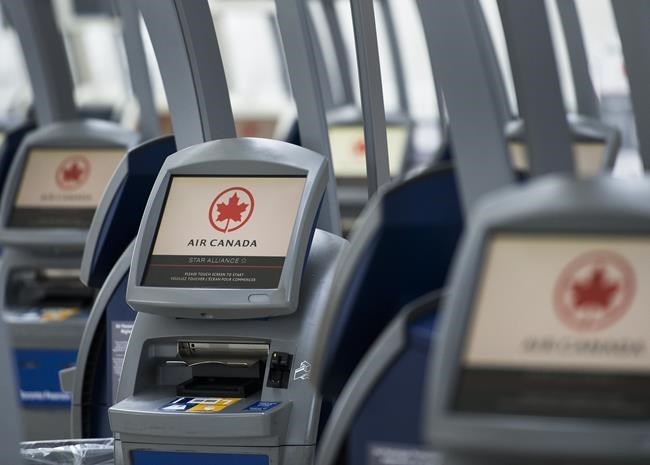MONTREAL — A "perfect storm" of problems lies behind Air Canada's wave of flight delays over the summer, its CEO said, even as the country's largest airline roars back to profitability — with no sign of slowing down.
Despite more staff and revamped technology, Air Canada's operations in June and July failed to meet "expected levels," Michael Rousseau told analysts on a conference call Friday.
The chief executive identified "severe weather" — thunderstorms, in particular — and "global supply chain issues" as among the culprits.
Tardiness and cancellations have especially plagued Air Canada's large network of regional flights, run by Jazz Aviation. Rousseau pointed to a pilot shortage, which he boiled down to several factors: new carriers such as Flair Airlines and Lynx Air competing for labour; stricter regulations on shift length, "which causes all airlines in Canada to add 10 to 15 per cent more pilots to fly the same schedule"; and dwindling enrolment at flight schools during the COVID-19 pandemic.
"We have this almost perfect storm that exists at this point in time," Rousseau said. "We're working hard with our partner, Jazz, on solving that problem right now … but it will take some time to transition."
In spite of tens of thousands of flight delays in its second quarter, Air Canada posted earnings that soared to pre-pandemic levels amid strong travel demand and pricier fares.
It reported net income of $838 million last quarter compared with a loss of $386 million a year earlier — and nearly a billion dollars in losses through all of 2022. Revenues grew more than a third to $5.43 billion, a record for the second quarter.
"Traffic and yields were incredibly strong, especially in international markets," said TD Cowen analyst Helane Becker in a note to clients.
High demand propelled more than 11 million customers across Air Canada's routes in the quarter, Rousseau said. Analysts also noted higher ticket prices led to thicker profit margins. Passenger numbers grew 23 per cent year-over-year, while passenger revenues jumped 42 per cent — a disparity that speaks to the hike in fares.
Across major Canadian airlines, domestic ticket prices dropped 17 per cent from 2019 levels in June through August — to $323 on average for a one-way fare — especially on the busiest routes, according to travel data firm Hopper. But many regional flights as well as international ones outside the United States saw fares shoot up — by 18 per cent to $593 for Mexico and Central America, 30 per cent to $1,166 for Europe and 99 per cent to $2,065 for Asia.
At Air Canada, advance ticket sales rose to $5.7 billion from $5.3 billion three months earlier, with no signs of dropping off, the company said.
Canadians' urge to travel remained unbridled by consistent delays across the airline's network, with half of the carrier's flights routinely arriving late or cancelled outright over the past two and a half months.
The company ranked last among North America's 10 biggest airlines for on-time performance in July, according to a report by aviation data firm Cirium this week.
Its planes arrived punctually 51 per cent of the time, versus 62 per cent for WestJet — in seventh place. Alaska Airlines, which had a similar number of monthly flights to Air Canada's 36,000, snagged the top spot at 82 per cent.
"Running the system hard — when things go wrong, they tend to cascade," said Barry Prentice, who directs the University of Manitoba's transport institute, suggesting Air Canada's capacity is stretched thin.
Charlene Hudy, who heads the Air Line Pilots Association's Air Canada contingent representing 4,500 employees, said the carrier is "falling short" on operations.
"We are very frustrated by those delays," she said in a phone interview.
Hudy, whose union opted to kickstart the bargaining process in June by ending its 10-year collective agreement a year early, called on the company to close an "unacceptable" pay gap between Canadian pilots and their American counterparts — in part to bring down attrition rates.
Last quarter, Air Canada shelled out 24 per cent more year-over-year on worker compensation, due to 22 per cent growth in its full-time-equivalent employees, the company said. A 31 per cent plunge in jet fuel prices from a year earlier helped offset the cost.
With an eye toward smoother traffic flow, Rousseau once again called on the federal government to overhaul the financial model for airports, which rely on passenger fees to operate and pay rent to Ottawa — a system that failed when the stream of travellers dried up.
"The pandemic really has exposed the weakness of our user-pay model," Rousseau said.
While U.S. airports ramped up operations earlier and never stopped receiving federal funds, Canadian ones took longer to resume post-pandemic activity and had less cash to do it with, said Prentice.
In the quarter ended June 30, Air Canada reported that operating revenues climbed 36 per cent to $5.27 billion from $3.98 billion in the same period a year earlier.
On an adjusted basis, diluted earnings hit $1.85 per share versus a loss of $1.12 per share a year prior, the Montreal-based company said Friday. The latest figure towered over analyst expectations of 68 cents per share, according to financial markets data firm Refinitiv.
Air Canada's total long-term debt and lease liabilities fell nine per cent to $14.89 billion from $16.31 billion at the end of 2022.
Its net debt-to-adjusted earnings ratio dropped to 1.7, a major improvement from 5.1 six months earlier.
This report by The Canadian Press was first published Aug. 11, 2023.
Companies in this story: (TSX:AC, TSX:CHR)
Christopher Reynolds, The Canadian Press



